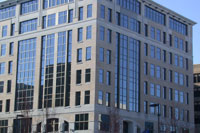
Vol. 75, No. 11, November
2002

State Bar of Wisconsin agrees with ABA and
New York Bar; law firms are not "financial institutions"
Gramm-Leach-Bliley law plagues legal profession
On Sept. 13, the State Bar of Wisconsin joined with Ohio in its
amicus brief to the New York State Bar Association (NYSBA) action
against the Federal Trade Commission (FTC) over its interpretation that
law firms and lawyers constitute "financial institutions" under the
Gramm-Leach-Bliley Act and are subject to the Act's privacy notice
provisions. On Sept. 25, the ABA filed a lawsuit with the U.S. District
Court for the District of Columbia asking the court to declare the
regulation unlawful.
The NYSBA based its lawsuit, which it filed last May, on two key
points: the Act as it applies to lawyers is unconstitutional under the
10th Amendment; and the FTC acted arbitrarily and capriciously in
refusing to exempt lawyers from compliance.
The ABA's lawsuit contends only that the FTC action, or inaction,
refusing to grant lawyers an exemption is arbitrary and capricious and
contrary to law. It does not make the constitutional argument.
Provisions of a federal law enacted in late 1999 under the
Gramm-Leach-Bliley Act became effective on July 1, 2001. The law
requires every "financial institution" that provides certain financial
services to its individual clients to send them a notice explaining its
privacy policies.
In June 2001, to the surprise of many, the FTC, which has the legal
responsibility to enforce the Act's provisions, determined that law
firms are "financial institutions." Therefore, law firms are required to
send privacy notices to individual clients who receive covered financial
services from them. Covered financial services include tax planning and
preparation, certain real estate settlement services, and other types of
financial services provided "primarily for personal, family, and
household" purposes.
"Lawyers are already subject to strict ethical rules under our Code
of Professional Responsibility, requiring us to keep client
confidences," said NYSBA President Steven Krane. "It is bureaucratic,
unnecessary, and inefficient to require that we send out so-called
'privacy notices' as well."
In his statement on Sept. 25, ABA President Alfred P. Carlton Jr.
said, "For more than 200 years, the lawyer ethics rules of the states
have protected the privacy and confidentiality of information clients
share with their lawyers, with good results. State regulation of
lawyer-client confidentiality is a cornerstone of the legal profession
and promotes the integrity of our legal system."
On Sept. 25, Rep. Judy Biggert (R-Ill.) introduced the Judicial Code
of Conduct Privacy Clarification Act to clarify that attorneys are
exempted from the privacy notice provisions of the Gramm-Leach-Bliley
Act. In announcing the bill's introduction, Biggert said, "At the end of
the day, our bill will make the intention of the Gramm-Leach-Bliley Act
crystal clear. The scope of the law was not intended to include law
firms and sole practicing lawyers."
See sidebar at left for historical dates relating to the
Gramm-Leach-Bliley Act. For more information or to access HR 5457, visit
www.wisbar.org/capup.
Gramm-Leach-Bliley important dates
Nov. 12, 1999. President Clinton signs
Gramm-Leach-Bliley Act into law, requiring financial institutions to
send notices explaining their privacy policies to individual
clients.
June 2001. Federal Trade Commission (FTC) determines
that law firms are "financial institutions" and therefore are required
to send privacy notices to clients by July 1, 2001.
June 8, 2001. ABA Board of Governors passes
resolution calling for FTC to issue an administrative ruling exempting
the practice of law from the statute's regulations.
July 1, 2001. Privacy notice provision becomes
effective.
Sept. 7, 2001. State Bar of Wisconsin adopts
resolution in support of the ABA efforts to exempt lawyers from the
privacy notice requirements of the Gramm-Leach-Bliley Act.
April 8, 2002. FTC denies ABA's request to exempt
attorneys from Title V of the Gramm-Leach-Bliley Act.
April 29, 2002. New York State Bar Association
(NYSBA) files suit with U.S. District Court for the District of Columbia
against FTC.
Sept. 13, 2002. State Bar of Wisconsin joins NYSBA
as an amicus in its suit against FTC.
Sept. 25, 2002. ABA files lawsuit with U.S. District
Court for the District of Columbia asking the court to declare unlawful
the regulation requiring lawyers to send "privacy notices" to
clients.
Sept. 25, 2002. Rep. Judy Biggert (R-Ill.)
introduces HR 5457, the Judicial Code of Conduct Privacy Clarification
Act, to clarify that attorneys are not subject to the Gramm-Leach-Bliley
Act notification provisions.
Law Library After Hours subscriptions expire
Dec. 31
It's time to renew
 |
| The Wisconsin State Law Library (above) is located at 120
Martin Luther King Jr. Blvd. in downtown Madison. Hours are weekdays, 8
a.m. to 5 p.m. For more information call (608) 266-1600 or visit wsll.state.wi.us. |
The State Law Library's After Hours Service, available to all
Wisconsin-licensed attorneys, allows access to the library from 7 to 8
a.m. and 5 to 10 p.m. weekdays, and 8 a.m. to 6 p.m. weekends. Regular
library hours are 8 a.m. to 5 p.m. weekdays.
Users can access the library's catalog and Web site, the Internet,
and a variety of electronic research tools.
After Hours Service is available by calendar year subscription. Each
attorney must subscribe individually. The cost for a 2003 subscription
is $80, which includes a convenient access tag that fits on a keychain.
State government attorneys with programmable ID or building access cards
may be eligible for a slight discount.
To obtain a subscription form, contact Connie Von Der Heide,
Reference/Outreach Services Librarian, at (608) 267-2202 or email connie.vonderheide@courts.state.wi.us.
Employers monitor email and Internet
connections
U.S. employers are aware of the dangers in workplace computer use and
are taking steps to reduce their liabilities. Of the 435 employers
surveyed, nearly 62 percent exercise their legal right to monitor
employees' email and Internet connections. In workplace lawsuits almost
10 percent of U.S. companies have been ordered by courts to produce
employee email.
Source: The 2001 Electronic Policies and Practices Survey,
conducted by the American Management Association, U.S. News & World
Report, and the ePolicy Institute.
Wisconsin Lawyer
